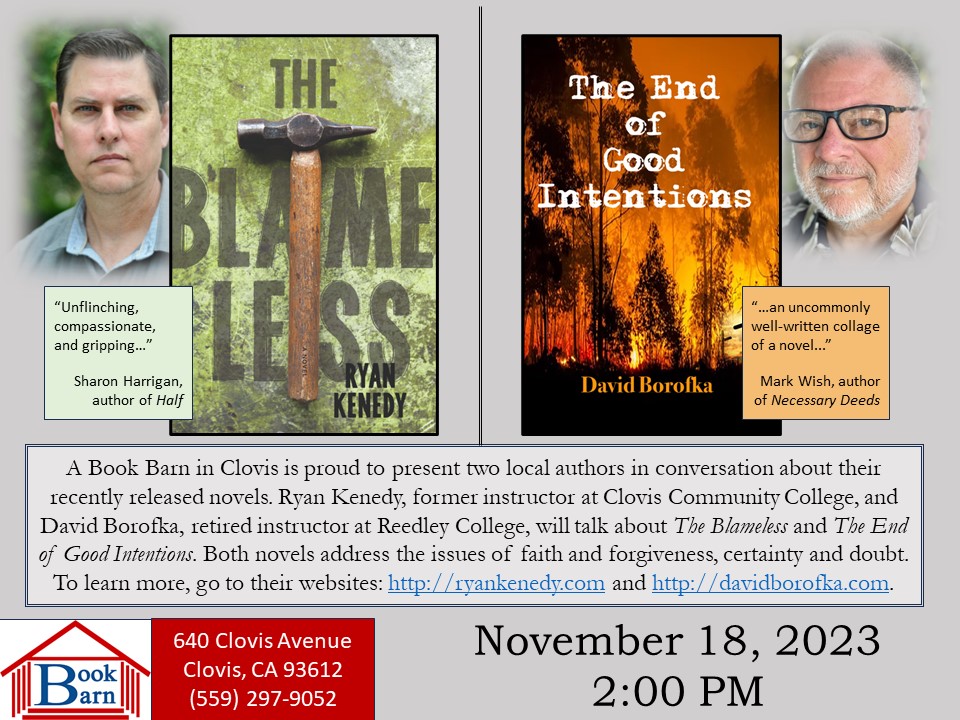
David Borofka in Conversation with Ryan Kenedy
Thursday Jan 30th, 2025
6:00 PM – 8:00 PM
Join us for an engaging evening in the bookshop as author David Borofka discusses his latest short story collection, The Bliss of Your Attention! He’ll be in conversation with local (and returning!) author Ryan Kenedy (The Blameless).
The Bliss of Your Attention is a powerful exploration of those who strive and fail—and strive again. In a world where “follow your bliss” has become both inspiration and cliché, Borofka’s characters are caught in the pursuit of connection, validation, and understanding, even when those things remain out of reach. With poignant humor and deep empathy, Borofka illuminates the often messy, imperfect nature of striving and dreaming.
Books are available for preorder in the shop and online. Please reserve your spot by RSVPing!
David Borofka is the author of multiple works of fiction, including Hints of His Mortality and The Island. His short stories have appeared in prestigious journals such as Image, Southern Review, and Missouri Review, among others. Borofka’s works have received numerous awards, including the American Fiction Award and the Missouri Review Editors’ Prize. A former full-time faculty member at Reedley College, he continues to teach for the Writers’ Program at UCLA Extension. He and his wife now divide their time between homes in Clovis, California and Ashland, Oregon.
Ryan Kenedy holds an MFA in Creative Writing from Fresno State University and teaches English at Moorpark College. His debut novel, The Blameless, was recently published by the University of Wisconsin Press. His short fiction has appeared in the North Dakota Review, North American Review, The Greensboro Review, and Sou’wester, and his short story collection, Don’t Let Them Fall, will be published by Johns Hopkins University Press in 2025.
Reedley College Presents
First Wednesday at One Reading Series
Ryan Kenedy and David Borofka
In Conversation – March 6, 2024, 1:00pm
________________________________________________________________________________
Interview with G.P. Gottlieb
MAY 1, 2024
https://www.gpgottlieb.com/authorinterviews
________________________________________________________________________________

 An Interview with Marshal Zeringue - Dec. 11, 2023
An Interview with Marshal Zeringue - Dec. 11, 2023

My Q&A with the author:
How much work does your title do to take readers into the story?
The title The Blameless occurred to me early on, even before I began writing the novel, which is unusual for me. Typically, I struggle to find good titles for my work and I'm rarely satisfied with the titles I settle on. But I knew The Blameless would be a novel about a man convicted of murder, so the idea of blame was central to my initial conception of the book. Of course, we all know what it's like to carry blame for hurting other people, and we also know what it's like to blame ourselves for things we shouldn't be blamed for, things that were never our fault, particularly those things that occurred during childhood. The novel's two main characters, Travis Lee Hilliard and Virginia Bigelow, struggle to process the lifelong effects of blame and guilt. Given who we are and all we've done, is true forgiveness even possible? Or to put in another way, can we ever become blameless?
What's in a name?
When I began writing this novel, I referred to the main character by his initials, L.T., but I didn't know what the initials stood for, and I wrote many pages before the name Travis Lee Hilliard occurred to me. I knew the character needed three names (we tend to remember murderers by their full name -- Lee Harvey Oswald, John Wilkes Booth, etc.). The problem, of course, is that L.T.'s initials don't work for Travis Lee, and yet T.L. sounded as awkward as Lee Travis Hilliard. Besides, I had grown accustomed to the name L.T. and didn't want to abandon it. To add to this complexity, L.T.'s mother had always called him Lee. And although L.T. admits that he never liked the name Travis (his father's name), it's the name he uses inadvertently when he introduces himself to the preacher and his family. So throughout the novel, Virginia refers to him as either Travis or Travis Lee Hilliard. But how to resolve the discrepancy between the character's full name and his initials? I decided his uncle Morris was to blame for this. Morris started calling the boy L.T. and nobody ever knew why, but it caught on, and only his mother continued to call him Lee. To me, these different names highlight the character's complicated identity both in terms of how he sees himself and how he interacts with others.
Do you find it harder to write beginnings or endings? Which do you change more?
In general, I find it harder to write endings than beginnings. Beginnings come easily to me, fueled by inspiration, I suppose, although the revision process tends to reveal the story's true beginning later in the narrative. This certainly happened when I wrote The Blameless. I started writing the novel forty or fifty pages before the actual story begins. But I needed to write those pages to become familiar with the characters and to develop a sense of the plot. Once I knew where I was headed, I was able to discard the original beginning with no regrets.
On the other hand, I'm more of a perfectionist when it comes to writing endings, perhaps because I demand too much from the end. I want it to do more than it's capable of doing. I didn't know how The Blameless would turn out until I was about thirty pages from the end. Suddenly, the book's final image came to mind, and, fearing I would lose it, I jumped ahead, wrote the last few pages ofthe novel, and then went back to finish the rest. I worked tirelessly on the final chapter, writing several parts over and over, but that last paragraph remained much as I had first written it.
Do you see much of yourself in your characters? Do they have any connection to your personality, or are they a world apart?
Yes, I see myself in my characters -- even when those characters are a world apart. This doesn't mean that the characters are versions of "me," or that they serve as manifestations of my personality. In most cases, my characters are very different from me. L.T. and Virginia are two very good examples. Still, I recognize something of myself in them: their frustrations and failures, their insecurities, their fears and desires. At the same time, although I never base my characters on real people, I can't help recognizing people I've known in one way or another. It's unavoidable. My characters are amalgamations of myself and everyone I've known, and all the books I've read and films I've watched, and everything I know and still don't understand about the human experience.
What non-literary inspirations have influenced your writing?
I've lived in California most of my life. The setting of my novel ranges from the Central Valley to Los Angeles to the Mojave Desert. There's something very stark about California's arid landscape that is rarely depicted in film. But the severity of this region often finds its way into my writing, in my descriptions of place and my characterizations.
Book Launch with Ryan Kenedy
Thursday, October 12, 2023
@ 7:00pm-8:30pm
We’re pleased to welcome local author Ryan Kenedy to the shop for the launch
of his debut novel, The Blameless (available 10/10)!

1910 E. Main St.
Ventura, CA 93001
(805) 628-3370
timbrebooks.com
Facebook (facebook.com/timbrebooks)
Instagram (@timbrebooks)
Lorem ipsum dolor sit amet, consectetur adipiscing elit. Ut elit tellus, luctus nec ullamcorper mattis, pulvinar dapibus leo.
